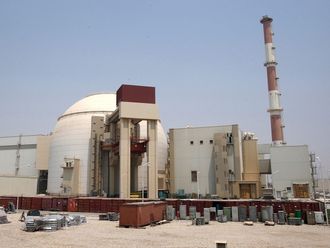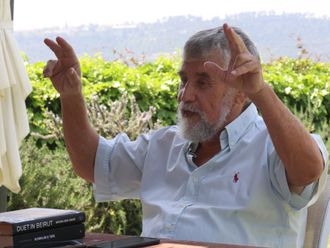
Beirut As Syria's revolution drags into its second year amid few signs that a UN-mandated ceasefire plan will end the violence, evidence is mounting that Islamist extremists are seeking to commandeer what began as a non-ideological uprising aimed at securing greater political freedom.
Activists and rebel soldiers based inside Syria say a small but growing number of Islamist radicals affiliated with global jihadi movements have been arriving in opposition strongholds in recent weeks and attempting to rally support among disaffected residents.
Western diplomats say they have tracked a steady trickle of jihadists flowing into Syria from Iraq, and Jordan's government last week detained at least four alleged Jordanian militants accused of trying to sneak into Syria to join the revolutionaries.
A previously unknown group calling itself the Al Nusra Front has asserted responsibility for bombings in the cities of Damascus and Aleppo using language and imagery reminiscent of the statements and videos by Al Qaida-affiliated organisations in Iraq, although no evidence of the group's existence has surfaced other than what it has posted on the internet.
Dangerous dimension
Syrian activists and Western officials say the militants appear to be making little headway in recruiting supporters within the ranks of the still largely secular protest movement, whose unifying goal is the removal of the regime led by President Bashar Al Assad. But if the UN's peace plan fails to end the government's bloody crackdown and promises of Western and Arab help for the rebel Free Syrian Army do not materialise, activists and analysts say, there is a real risk frustrated members of the opposition will be driven toward extremism, adding a dangerous dimension to a revolt that is threatening to destabilise a wide arc of territory across the Middle East.
"The world doing nothing opens the door for jihadis," said Lt Abdullah Al Awadi, a Free Syrian Army commander who defected from the regular army in the summer and was interviewed during a visit he made to Turkey. He says he has rebuffed several offers of help from militant groups in the form of arms and money and he fears the extremists' influence will grow.
"This is not a reason for the international community to be silent about Syria. It should be a reason for them to do something," Al Awadi said. US officials and Western diplomats in the region, who spoke on the condition of anonymity, say they have seen several indications Al Qaida-like groups are trying to inject themselves into the Syrian revolution, although they stress the impact has been limited.
Al Qaida leader Ayman Al Zawahiri called on "mujahideen" to head to Syria in support of the rebels earlier this year, and Western diplomats are convinced operatives affiliated with Al Qaida carried out a string of bombings in Damascus and Aleppo between December and March. The diplomats say dozens of jihadis have crossed the border from Iraq into Syria, some of them Syrians who had previously volunteered to fight in Iraq and others Iraqi.
There may also be other foreign nationals among them, reversing the journey they took into Iraq years ago when jihadis flowed across the border to fight the now-departed Americans.
The Syrian government facilitated the flow of foreign fighters into Iraq for many years, and there are widespread suspicions it may be covertly reactivating some of those networks to discredit the revolutionaries, deter international support for the opposition and create conditions under which the harsh crackdown by authorities will appear justified.
The regime portrayed the uprising as the work of radical Islamists in its earliest days, and the reports extremists are surfacing in Syria only play into the official narrative, said Salman Shaikh, director of the Brookings Doha Centre in Qatar.
"This drip, drip, drip of extremists across the border... there are signs the regime is aiding and abetting it," Shaikh said.
"And it will become a self-fulfilling prophecy." It is also plausible that these groups, adherents of a radicalised form of Sunni Islam, have turned against their former benefactors and are making their way back to Syria motivated by religious and sectarian zeal.












